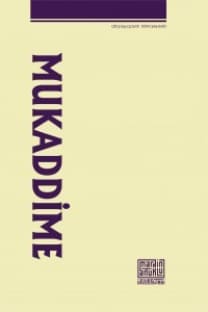"Meşru Bilgi" Karşısında Öğrenci Stratejileri
Eğitim bilimleri alan yazınında öğrencinin "meşru bilgi" karşısında edilgen bir şekilde konumlandırıldığı belirtilmektedir. Bu çalışmanın amacı müfredatın meşru bilgisi karşısında öğrenci stratejilerini, bilgi ve bilgi ürünleri ile ilişkiyi ifade eden "bilgi ile ilişki" kavramı yardımı ile saptamaktır. Araştırma, tarama türünde bir örnek olay çalışmasıdır. Çalışma grubu Türkiye eğitim sisteminde okumuş ve üniversite mezunu otuz kişiden oluşmaktadır. Veri toplama aracı olarak geliştirilen görüşme formu öğrencilerin kişisel bilgileri ve bilgi ile ilişkilerini anlamaya yönelik sorulardan oluşturulmuştur. Çalışmada "bilgi karşısında sorgusuz sualsiz, resmi bilgilenmeye karşı stratejiler, sermaye olarak bilgi ve öğretmene ve derse göre değişen tutum" olmak üzere dört tema saptanmıştır. Buna göre öğrenciler kendi toplumsal dünyaları çerçevesinde bilgi ile ilişki kurmuşlardır. Öğrenciler müfredatın meşru bilgisi karşısında kabul edici, bilgi biriktirici, reddedici ve seçici bir tavır sergilemişlerdir.
Anahtar Kelimeler:
Meşru bilgi, bilgi ile ilişki, öğrenci stratejileri
The Strategies of Students Against "Legitimate Knowledge"
In educational sciences literature, it is stated that students are positioned in a passive way against "legitimate knowledge". The aim of this study is to determine students’ strategies against the legitimate knowledge with "relationship with knowledge" concept which implies the relation knowledge and products of knowledge. The study is a case study in survey research model. The working group is composed of thirty people who studied and graduated from universities in Turkey. The interviewing form includes questions about students' personal information and used to understand their relation to the knowledge. In the study four themes have been identified such as "unquestioning the knowledge, strategies against the officially being informed, knowledge as capital and changing attitudes towards teachers and lessons. According to these students have established relation to the knowledge within their own social worlds. Students have demonstrated an acceptancing, objecting to accumulate knowledge, and selective manner towards legitimate knowledge of the curriculum.
___
- Ahıska, M. (2009). Garbiyatçılık: Türkiye’de Modernliğin Grameri. Ömer Laçiner (Ed). Modern Türkiye’de Siyasi Düşünce: Dönemler ve Zihniyetler içinde. 9. Cilt. İstanbul: İletişim.
- Apple, M. (2000). Official Knowledge: Democratic Education in a Conservative Age (2. Baskı). New York: Routledge.
- --------------- (2004). Neoliberalizm ve Eğitim Politikaları Üzerine Eleştirel Yazılar. Ankara: Eğitim Sen.
- --------------- (2006). Eğitim ve İktidar. Ankara: Kalkedon.
- Balcı, A. (2015). Sosyal Bilimlerde Araştırma: Yöntem Teknik ve İlkeler. Ankara: Pegem Akademi.
- Beltekin, N. (2014). Okul ve Öteki Yurttaşlar: Kürt Politik Aktörlerini Eğitimsel Deneyimleri. İstanbul: Vate.
- Bourdieu, P. (2007). Pratik Nedenler (Hülya Uğur Tanrıöver, Çev.). İstanbul: Hil.
- Charlot, B. (1997). Du Rapport Au Savoir, Éléments Pour Une Théorie. Edition Anthropos: Paris.
- ---------------- (1997). Bilgiyle İlişki (Seçkin Özsoy, Çev.). "Le rapport au savoir", chapitre du livre Education et formation: recherches et politique éducatives (dir. Jean Bourdon), éditions du CNRS, 1999, p. 17-34.
- ---------------- (1999). "Le rapport au savoir" (Seçkin Özsoy, Çev.). chapitre du livre Education et formation: recherches et politique éducatives (dir. Jean Bourdon), éditions du CNRS, p. 17-34.
- ---------------- (2010). Challenges of Education in Contemporaneity: Thoughts of a Researcher. Röp: Teresa Cristina Rego, Lucia Emilia Nuevo Barreto Bruno. Educaçâo e Pesquisa. vol.36 no.spe São Paulo Apr. 2010. http://www.scielo.br/scielo.php?pid=S151797022010000400012&script=sciİarttext&tlng=en 01/02/2011
- Dirihî, A. (2010). Yado. Kovara Vate, nr.14 (34), Payîz 2010, r.26-44
- Fırat, B. Ş. (2010). Burda Benden Bir şey Yok Mu Öğretmenim? Eğitim Sürecinde Kimlik, Çatışma ve Barışa Dair Algı ve Deneyimler. İstanbul: Tarih Vakfı.
- Foucault, M. (2006). Hapishanenin Doğuşu (Mehmet Ali Kılıçbay, Çev.). Ankara: İmge Kitapevi.
- Kümbetoğlu, B. (2005). Sosyolojide ve Antropolojide Niteliksel Yöntem ve Araştırma. İstanbul: Bağlam.
- Maury, S., Caillot, M. (2003). Rapport au savoir et didactiques. Paris: Fabert.
- Ouyang, Y. (2008). Cultural conflict and Chinese students' relationship to knowledge in contemporary China. http://www.bu.univ-paris8.frwebcollectionsthesesOuyangThese. 01/03/2011
- Özsoy, S. (2002). Yükseköğretimde Hakkaniyet ve Eşitlik Sorunsalı: Türkiye'deki Finansal Yapıyla İlgili Bir Çözümleme. Yayınlanmamış Doktora Tezi, Ankara.
- Pouliot, C,. Bader, B,. Therriault G. (2010). The notion of the relationship to knowledge: A theoretical tool for research in science education. International Journal of Environmental & Science Education, Vol. 5, No. 3, July 2010, 239 -264.
- Seth, S. (2007). Changing the Subject: Western Knowledge and the Question of Difference. Comparative Studies in Society and History, 49/3.
- Yavuz, İ. (2009). Didaktiksel Dönüşüm Teorisi Ve Matematik Eğitimindeki Uygulamalar. M.Ü. Atatürk Eğitim Fakültesi Eğitim Bilimleri Dergisi, Sayı: 30, s. 173 – 187.
- Yıldırım, A., Şimşek, H. (2008). Sosyal Bilimlerde Nitel Araştırma Yöntemleri (7. Baskı). Ankara: Seçkin.
- ISSN: 1309-6087
- Yayın Aralığı: Yılda 2 Sayı
- Başlangıç: 2010
- Yayıncı: MARDİN ARTUKLU ÜNİVERSİTESİ
Sayıdaki Diğer Makaleler
Sosyal Bilimler Metni Olarak Mukaddime: Bir Meta-Anlatı
"Meşru Bilgi" Karşısında Öğrenci Stratejileri
Mardin’deki Arapça Sözlü Kültürünün Korunmasında Hikâye Gecelerinin Rolü
Çağdaş Türk Tarihyazımında Muhalif Bir Anlatı Olarak Süryani / Asuri Sözlü Tarihi
Sosyal Bilimlerde "Objektiflik" Efsanesi
Sosyal Bilimlerde "Objektiflik" Efsanesi
